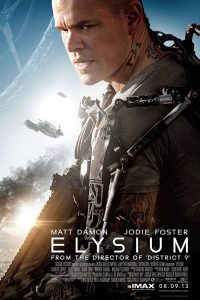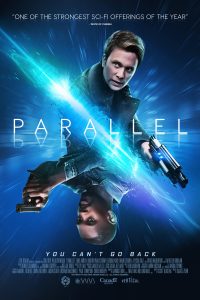The Black Guy Dies First: Arley Sorg and Josh Pearce Discuss They Cloned Tyrone
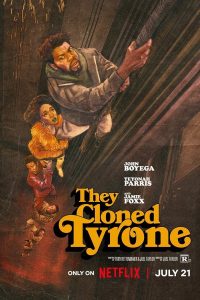 Imagine a mix of Us and Sorry to Bother You — a movie where you’re not sure at first where things are going, and then suddenly you take a left turn and find yourself in the middle of (literal) underground government experiments. That’s They Cloned Tyrone. The cloning isn’t a surprise — it’s in the title, after all — but it’s also not the end of the science fiction rabbit hole, as our unlikely protagonists find out.
Imagine a mix of Us and Sorry to Bother You — a movie where you’re not sure at first where things are going, and then suddenly you take a left turn and find yourself in the middle of (literal) underground government experiments. That’s They Cloned Tyrone. The cloning isn’t a surprise — it’s in the title, after all — but it’s also not the end of the science fiction rabbit hole, as our unlikely protagonists find out.
When a pimp named Slick Charles (Jamie Foxx), and a sex worker named Yo-Yo (Teyonah Parris) witness the murder of drug dealer Fontaine (John Boyega), they are shocked to see him again the next day, apparently unhurt and without any memory of his own death.
“In Barbie and They Cloned Tyrone we have two excellent examples of how uniquely effective speculative fiction is to comment on the human condition amid Climate Change, late Capitalism and the realization that our leaders have no interest in fixing these issues.” – Alex Jennings
Josh: I thought this movie was fun. I wasn’t sure what to expect from it — it’s Netflix, and that can be hit or miss, but it ended up being really funny.
Arley: There are so many great things about this movie, and I’ve never seen a movie quite like this before. For Netflix, this has got to be one of the better ones I’ve ever seen.
Josh: I was surprised at even just the film quality and cinematography. Often a streaming movie is all muddy lighting and colors, and lacks any creative shot composition or directing, but this was really solid on all points.
Background signage on storefronts, license plates, TV commercials, lottery tickets, and nearly anywhere else the camera lingers adds a sense of the uncanny to the film’s worldbuilding. The generic superficiality of printed or broadcast messages makes it feel like the characters are walking around a movie set or being brainwashed by aliens. (Director/co-writer Juel Taylor cites They Live and The Truman Show as influences.) There are other fun Easter eggs, such as “DJ Strangelove,” and explicit A Clockwork Orange references.
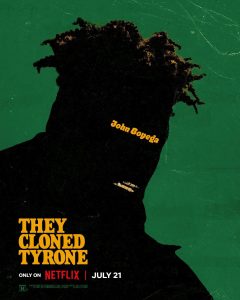 Unable and/or unwilling to involve the authorities, Fontaine, Yo-Yo, and Slick Charles follow a series of clues that lead them to the truth about their neighborhood, the nature of their lives, and the roles they’re meant to play in the grand schema of America. They find themselves in a web of religion, assimilation, and vice that would not be out of place in the theories of Gary Webb’s Dark Alliance: The CIA, the Contras, and the Crack Cocaine Explosion or the original Deus Ex video game.
Unable and/or unwilling to involve the authorities, Fontaine, Yo-Yo, and Slick Charles follow a series of clues that lead them to the truth about their neighborhood, the nature of their lives, and the roles they’re meant to play in the grand schema of America. They find themselves in a web of religion, assimilation, and vice that would not be out of place in the theories of Gary Webb’s Dark Alliance: The CIA, the Contras, and the Crack Cocaine Explosion or the original Deus Ex video game.
“It’s smarter than it looks. It rides alongside I’m a Virgo, Sorry to Bother You, Swarm, Atlanta, and other Afro-surrealist tales. The absence of formula looks something like ‘They the secrets from the cookout’ (those things that Black people say to each other) and make it both public and credible. Like Italian Giallo, They Cloned Tyrone starts with the absurd, which is read merely as exploitation. But as it goes forward, the absurdity doesn’t stop but rather runs head first into the absurdity of American racial prejudice and the myths the forever subjected class have always ‘known’ to be true.” – Ayize Jama-Everett
Josh: I was gonna say that it’s like they’re literalizing the metaphor, except that it’s not even a metaphor. Some of these things are actual systems of control.
Arley: Pretty much everything in this movie is the literalization of a lot of things that we have been talking about in Black communities for a really long time. And some of those ideas I grew up hearing – well. A lot of them turned out to be true, or close to true. But people were talking about them as conspiracies when I was a kid. We collectively kind of knew but couldn’t prove, or couldn’t be sure if they were true, or to what extent. Even if we could prove something, we knew nothing real would come of it. In Black communities these conspiracies are so often associated with a “type” that those “types” have been spoofed in shows from In Living Color (the Oswald Bates character) to A Black Lady Sketch Show (the Dr. Haddassah Olayinka Ali-Youngman, Pre-PHD character). More serious attempts to engage in conversations around conspiracies have been attempted by folks from The Black Panthers to Public Enemy – “1 Million Bottlebags” is a great example, about the deliberate distribution of malt liquor in Black communities. We know about the Tuskegee experiment, but pretend like there haven’t been other incidents. We have specials like Hulu’s The United States vs. Billie Holiday and TV shows openly discussing messed up things the government has done to Black folks, but these shows don’t incite any actual change, or even belief or sympathy from outside Black communities. We’re lucky if we get some head shaking and a “that’s so awful.” This film is participating in those conversations, it’s exaggerating, it’s satirizing, but it’s also saying, “we all know there’s actually some truth in this.” And it’s using science fiction as a fun, engaging, creative modality to do it, which makes it even more awesome.
“They Cloned Tyrone is destined to be a cult classic. It’s a smart, funny movie that reaches back to the past, using and updating Blacksploitation tropes to make an earnest statement about today. While I found much of the social commentary to be ‘on the nose’, the performances were stellar and the film had enough heart and soul to ultimately smooth over its flaws.” – L. Penelope
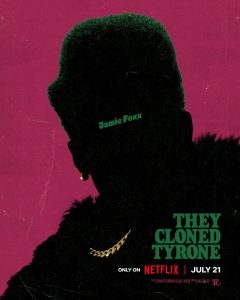 In a world where every conspiracy turns out to be real, there is the danger of succumbing to fatalism or a self-defeating worldview that cedes control to omnipresent, omnipotent, malevolent forces and, for just a moment, Fontaine almost gives into that — until Yo-Yo talks him back from the brink. In other mystery or (especially) horror movies, a protagonist will decide to investigate a dark area alone, against all the audience’s screamed advice. Purely for plot convenience, they never seem to call the police or anyone else more well-equipped.
In a world where every conspiracy turns out to be real, there is the danger of succumbing to fatalism or a self-defeating worldview that cedes control to omnipresent, omnipotent, malevolent forces and, for just a moment, Fontaine almost gives into that — until Yo-Yo talks him back from the brink. In other mystery or (especially) horror movies, a protagonist will decide to investigate a dark area alone, against all the audience’s screamed advice. Purely for plot convenience, they never seem to call the police or anyone else more well-equipped.
In They Cloned Tyrone, those decisions are never questioned. This is their area, and these events are affecting each character directly, so they take control and figure things out themselves in believable sequences. It’s a good setup, and allows the writers to get properly motivated characters to where they need to be. Fontaine is, naturally, curious about his own death and resurrection. Yo-Yo wanted to be a reporter, and still possesses an investigative streak instilled in her by reading stacks of Nancy Drew mysteries. Despite his initial misgivings, even Slick Charles gets caught up in the fun, and sticking his nose into what he thinks are drugs provides them with a crucial clue.
“A meta movie that literally starts with the White Gaze on ‘the culture’ had better come correct, and They Cloned Tyrone hit like Attack the Block grew up and took a poli-sci course. Satire is my jam, and TCT lived fully in its own hyper-real tragic kingdom, delivering laughs, enough thought to keep the mind playing after the movie ended, and performances from Boyega, Parris, and Foxx that was a 2-hour masterclass.” – Zig Zag Claybourne
Arley: Even the idea of them using “a pimp, a drug dealer, and a hoe” is cool and complex. Not only are there theories about these as being iconic tools of “the man” (in other words, systemic racism and the deliberate attack on Black communities) but there’s also a metanarrative aspect in terms of taking these archetypes, characters which are commonly stereotyped and, via the act of stereotyping, dehumanized – reduced to sets of assumptions, one of those assumptions the inevitability of who they are and what they do; and via narrative rendering them instead as unlikely heroes. Teasing out personality, making them more fully fledged people. Standing against the idea of them as disposable. To add another level, Fontaine is like, “Oh, yeah, nobody is good here. What’s the point?” Almost like, “We aren’t people,” demonstrating that internalized racism via monologue near the end. Internalized racism is even more insidious by its invisibility, yet here it also gets represented through satire. Utilizing these characters ultimately becomes more of a statement of the vulnerability of individuals, and commentary on the concept of how much your circumstances and opportunities attempt to constrain or limit who you are and what you do. Circumstances designed by racist systems, by the way. Black people are people, not stereotypes, in other words. I thought it was really, really smart.
Josh: All those characters, the actors, and especially their dynamics off each other were brilliant. You never get to the point where you’re like, “Why is this person tagging along?” or, “This person doesn’t have anything to do.” Everyone had a motivation and a transformation. It’s hard to carry three main characters all throughout your film, but this worked really well. This is my favorite Jamie Foxx performance in a long time. They gave him so many good lines, or he ad-libbed a bunch of good lines, I’m not really sure which.
Arley: I did have a moment or two where plot events felt a little bit too convenient. Like, this one scene where the bad guys don’t just kill them….
Josh: Yeah, he’s like, “You’re just gonna go along with your life because you have no control.” Maybe it was a power trip thing like, “You know what the conspiracy is, but we don’t care enough to do anything about it because we don’t really think you can stop us.”
“They Cloned Tyrone brilliantly weaves together sci-fi, mystery, and thriller vibes in a setting where the world and characters are unapologetically and wonderfully Black.” – N.E. Davenport
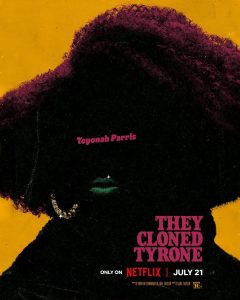 Reference and homage extend even into the composition of the film itself, both celebrating and satirizing Blaxploitation*: there are several throwbacks to the style of 1970s movies in the color palette, set design, and costumes. There’s an added grainy filter, with “cigarette burn” changeover marks in the corner of the frame, to make it look as though it’s been shot on old film.
Reference and homage extend even into the composition of the film itself, both celebrating and satirizing Blaxploitation*: there are several throwbacks to the style of 1970s movies in the color palette, set design, and costumes. There’s an added grainy filter, with “cigarette burn” changeover marks in the corner of the frame, to make it look as though it’s been shot on old film.
There are an abundance of cheap digital filters to give that same effect, but in this film it looks good. The many interesting details to sift through do not detract from the movie’s message. They Cloned Tyrone cleverly questions the way things are, maintains constant and consistent humor, and serves up an entertaining movie at even a basic plot level.
“My jaw dropped watching They Cloned Tyrone. No punches pulled, at all! Juel Taylor captured the anywhere, everywhereness of Black Southern weird. The film dramatized the greatest hits of Black urban conspiracy theories rooted in gritty realism, past and present, and the performances were wonderful. Every. Single. One. The absurdity of public policies directed at Black communities was on full display, giving us a little bit of Glover’s surrealist Atlanta, Brewer’s Hustle and Flow, Riley’s Sorry to Bother You, and The Spook Who Sat By the Door. It was everything, and I loved it!” – Sheree Renée Thomas
Arley: The more you watch this movie, the more cool little tidbits you’ll find.
Josh: It would definitely bear rewatching.
Arley: I love how they signal that even when white people study Black people, they still don’t get it quite right. There are subtle nods to this here and there, and then later, a big, plot relevant gesture, which is key to Yo-Yo’s action sequences. It’s not only a device for her to do what she needs to do in the film, but it becomes commentary on the larger structure of people making assumptions and generalizations, while also adding a layer of the way judgments and assumptions negatively influence communities themselves. The way ideas of beauty are weaponized, in a sense, both literal and figuratively.
Josh: The whole heist or whatever was clever from beginning to end. There are all these different steps, and these characters are ahead of not only the villains, but also way ahead of the audience. And they made it work even in an era of complete surveillance in a way that didn’t seem gimmicky. Side note: There is a character in Bioshock named Fontaine, and he controls people with voice commands. Coincidence? Or conspiracy?
Arley: You’ll never know.
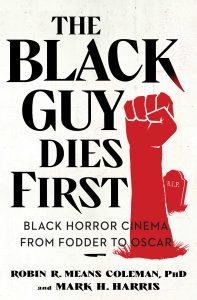 *In The Black Guy Dies First (Saga 2/7/23) authors Coleman and Harris describe Blaxploitation as reflecting “a growing social openness to increased Black representation in films, along with the desperation of financially strapped studios… looking to cash in on an underserved demographic.” They cite the era as “coming to fruition in the late ‘60s… with a deluge of Blackness to come in the ‘70s, a body of work generally (and unfairly) lumped under the ‘Blaxploitation’ umbrella.” The book counts “no less than three hundred Black-centric movies Blaxploding onto screens by the end of the decade…” including speculative entries such as Blackula, Blackenstein, and Dr. Black, Mr. Hyde.
*In The Black Guy Dies First (Saga 2/7/23) authors Coleman and Harris describe Blaxploitation as reflecting “a growing social openness to increased Black representation in films, along with the desperation of financially strapped studios… looking to cash in on an underserved demographic.” They cite the era as “coming to fruition in the late ‘60s… with a deluge of Blackness to come in the ‘70s, a body of work generally (and unfairly) lumped under the ‘Blaxploitation’ umbrella.” The book counts “no less than three hundred Black-centric movies Blaxploding onto screens by the end of the decade…” including speculative entries such as Blackula, Blackenstein, and Dr. Black, Mr. Hyde.
Guest quotes provided at invitation.
Directed by: Juel Taylor
Written by: Tony Rettenmaier & Juel Taylor
Starring: John Boyega, Jamie Foxx, Teyonah Parris, Kiefer Sutherland, David Alan Grier, J. Alphonse Nicholson, Tamberla Perry, Eric Robinson Jr. & Trayce Malachi

JOSH PEARCE has stories and poetry in Analog, Asimov’s, Beneath Ceaseless Skies, Cast of Wonders, Clarkesworld, IGMS, Nature, and more. Find him on Twitter: @fictionaljosh, or at fictionaljosh.com. One time, Ken Jennings signed his chest.
ARLEY SORG, Senior Editor and associate literary agent at kt literary, has been part of the Locus crew since 2014. Arley is a 2023 Space Cowboy Award recipient and a 2022 Kate Wilhelm Solstice Award recipient. He is also a 2021 and 2022 World Fantasy Award finalist as well as a 2023 and 2022 Locus Award finalist for his work as co-Editor-in-Chief at Fantasy Magazine. He is a 2022 Ignyte Award finalist in two categories: for his work as a critic, and for his essay “What You Might Have Missed” in Uncanny Magazine. Arley is Associate Editor and reviewer at Lightspeed & Nightmare magazines, columnist for The Magazine of Fantasy and Science Fiction, and interviewer at Clarkesworld Magazine. He grew up in England, Hawaii, and Colorado, and lives in the SF Bay Area. A 2014 Odyssey Writing Workshop graduate, he can be found at arleysorg.com – where he has started his own “casual interview” series with authors and editors – as well as Twitter (@arleysorg) or Facebook.
 While you are here, please take a moment to support Locus with a one-time or recurring donation. We rely on reader donations to keep the magazine and site going, and would like to keep the site paywall free, but WE NEED YOUR FINANCIAL SUPPORT to continue quality coverage of the science fiction and fantasy field.
While you are here, please take a moment to support Locus with a one-time or recurring donation. We rely on reader donations to keep the magazine and site going, and would like to keep the site paywall free, but WE NEED YOUR FINANCIAL SUPPORT to continue quality coverage of the science fiction and fantasy field.
©Locus Magazine. Copyrighted material may not be republished without permission of LSFF.




